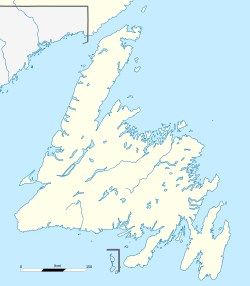Admirals Beach
 From Wikipedia - Reading time: 9 min
From Wikipedia - Reading time: 9 min
Admirals Beach | |
|---|---|
Town | |
Location of Admirals Beach in Newfoundland | |
| Coordinates: 47°00′17″N 53°38′32″W / 47.00472°N 53.64222°W | |
| Country | |
| Province | |
| Census division | 1 |
| Settled | c. 1805 |
| Incorporated (town) | January 16, 1968 |
| Government | |
| • Mayor | Keith Guitar |
| • MLA | Sherry Gambin-Walsh (Placentia-St. Mary's) |
| • MP | Ken McDonald (Avalon) |
| Area | |
| • Land | 24.42 km2 (9.43 sq mi) |
| Population (2021)[1] | |
• Total | 97 |
| Time zone | UTC-3:30 (Newfoundland Time) |
| • Summer (DST) | UTC-2:30 (Newfoundland Daylight) |
| Postal Code | A0B 3A0 |
| Area code | 709 |
| Highways | |
Admirals Beach is a rural community located in Newfoundland and Labrador, Canada.
Previously spelled Admiral's Beach, it is a fishing port located on the island of Newfoundland; specifically it is along a point of land in the southern Avalon Peninsula near Great Colinet Island fronting St. Mary's Bay.
The community was incorporated in January 1968.
Geography
[edit]Good fishing grounds and a sheltered cove attracted the first settlers to the area. The town is part of Division 1 and is bounded by St. Mary's Bay and the unorganized area Subdivision W. Nearby communities include St. Joseph's, Riverhead and St. Mary's.
History
[edit]Admirals Beach was first settled in the early nineteenth century by a French admiral. In 1864 there were three families living there. By 1911 it had a Post Office and a population of 39. The community grew over the years until a large population came from Great Colinet Island during the resettlement programme of 1956. Its population in the 2016 Census was 135.[2]
Demographics
[edit]In the 2021 Census of Population conducted by Statistics Canada, Admirals Beach had a population of 97 living in 48 of its 76 total private dwellings, a change of -28.1% from its 2016 population of 135. With a land area of 24.2 km2 (9.3 sq mi), it had a population density of 4.0/km2 (10.4/sq mi) in 2021.[1][2]
Economy
[edit]Although the majority of its residents were fishermen, Admirals Beach also had two ship building yards where fishing boats and longliners were built with supplies from local sawmills.
See also
[edit]References
[edit]- ^ a b "Population and dwelling counts: Canada, provinces and territories, census divisions and census subdivisions (municipalities), Newfoundland and Labrador". Statistics Canada. February 9, 2022. Retrieved March 15, 2022.
- ^ a b "Census Profile, 2016 Census: Admirals Beach, Town [Census subdivision], Newfoundland and Labrador". 8 February 2017. Retrieved October 20, 2019.
 KSF
KSF
